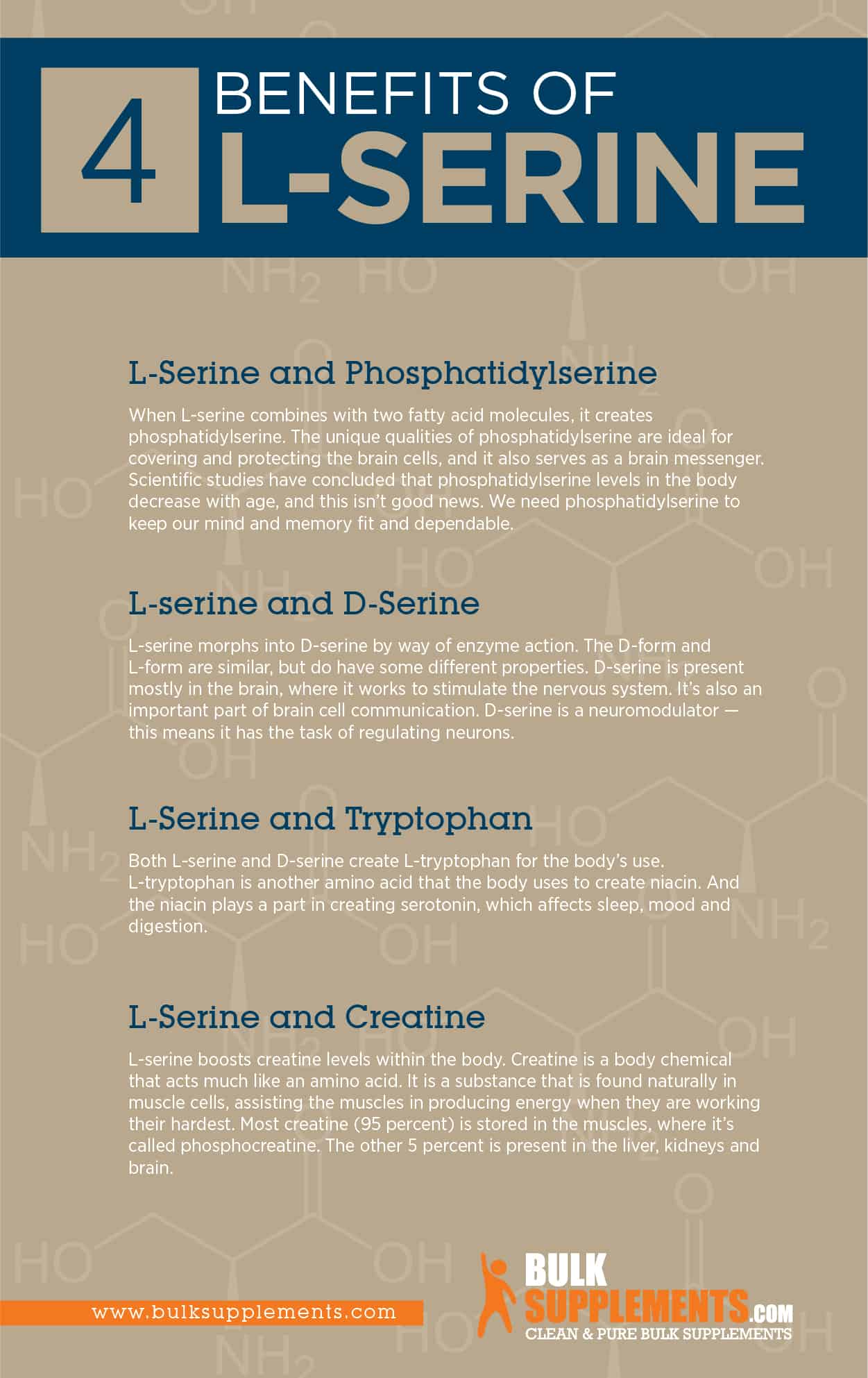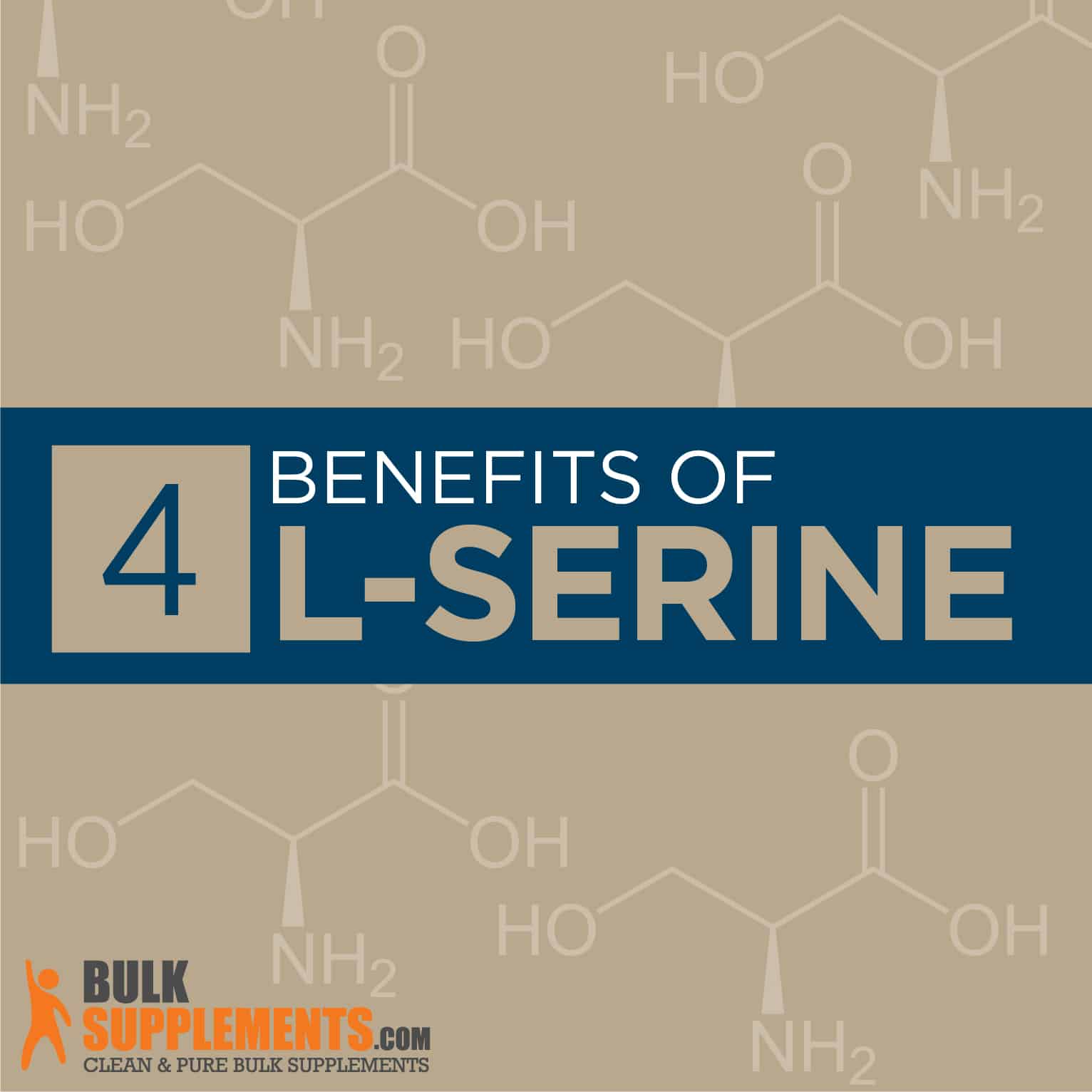If you’ve never tried L-serine supplements, you may be missing out on an array of potential health benefits. L-serine is a nonessential amino acid that plays an important role in several of the body’s vital functions such as forming compounds with fatty acids to support brain activity, converting to D-serine to protect the nervous system and promoting mental health. L-serine also naturally plays a role in muscle growth and muscle function, synthesizing proteins and producing antibodies and immunoglobulins for a healthy immune system.
L-serine is a very important part of the body and supplements may be able to perform the same functions. However, there are no studies that completely prove its effects. The supplement is not intended to completely treat or cure any condition or illness on its own. Always consult your healthcare provider before taking any supplements.
What Is L-Serine?
L-serine is called a nonessential amino acid because the body makes it naturally. It comes from the amino acids glycine and threonine and it’s also found in food. There are actually manufactured two forms—L-serine and D-serine. German chemist Emil Cramer was the first to discover L-serine in 1865 from silk protein secretions from the larvae of pupating silkworm caterpillars. Since its discovery, research has improved as the health and medical industry continue to learn about L-serine’s importance to the body (x, x).
The body makes L-serine on its own, but it’s also possible to get it from your diet. There are a number of foods high in L-serine (x, x, x, x):
- Eggs
- Soy protein
- Seaweed
- Spirulina
- Dairy
- Turkey
- Beef
- Seafood / shellfish
- Peanuts
- Almonds
- Seeds
- Chickpeas
- Lentils
Amino Acids
Amino acids are vital to us because they make proteins, which are essential to life. Hence they are labeled as the “building blocks” of life. There are 20 different amino acids in the body. They typically fall into three groups (x):
- Essential amino acids: Not produced by the body and must come from our diet
- Nonessential amino acids: Produced in the body naturally without dietary sources
- Conditional amino acids: Usually only essential during stress or illness
Besides forming proteins, amino acids also repair muscle and other tissues; create vital neurotransmitters, hormones and enzymes; boost metabolism; and step in to provide energy when the body is deficient in carbohydrates and fats (x, x, x, x).
L-Serine vs. D-Serine
There are two types of serine molecules: L-serine and D-serine. They are isomers of each other, meaning they are the same atoms, but arranged differently. How are they different? Well, the cells use L-serine to synthesize other amino acids, such as cysteine and tryptophan. These types of proteins are mostly involved in the body’s enzymatic and hormonal reactions. L-serine becomes D-serine in our neural tissues when triggered by the enzyme serine-racemase. D-serine supports the brain and the nervous system by functioning as a neurotransmitter (x, x, x, x).

What Are the Benefits of L-Serine Supplements?
What does L-serine do in the body? Why would anyone need to take supplements, especially because it’s a nonessential amino acid and the body makes it on its own? But supplemental L-serine may benefit individuals with both adequate and inadequate levels of the amino acid, as well as those certain medical conditions (x, x). Always consult your healthcare provider for diagnoses, accurate medical information and permission before taking any supplements. The amino acid naturally plays a natural role in:
- Cognitive function
- Mood & mental health
- Muscle formation
- Immune function
Cognitive Function
Serine plays a number of critical roles in proper brain function, especially D-serine. The human brain needs D-serine for cell communication throughout the body. That includes synthesis of the phospholipid phosphatidylserine in brain cell membranes. This important compound plays a role in memory and cognitive function.
Studies state that l-serine may also help protect brain tissue and reduce inflammation, which in turn improves neurological function and mood and stimulates muscle movement. The amino acid may play a natural role in reducing the risk for neurodegenerative diseases. Physicians associate difficulties with movement, gait, posture and muscle control with diseases like Huntington’s and amyotrophic lateral sclerosis (ALS), as well as fatigue and insomnia. Other studies state that L-serine may also play a role in reducing the risk for Alzheimer’s disease (x, x, x, x, x, x, x, x).
Mental Health & Sleep
L-serine plays an integral role in creating and regulating the myelin sheets, which cover and protect the nerves. Insufficient L-serine levels may cause the sheets to thin or eradicate them completely, exposing the nerves to damage and interference with the brain’s ability to signal them (x).
Both L-serine and D-serine contribute to the synthesis of the amino acid tryptophan, which helps synthesize serotonin. Often called the “happy hormone,” serotonin is a biochemical compound that acts as a neurotransmitter in the brain. A number of studies suggest that it plays a role in mood and researchers associate low serotonin levels with an increased risk for depression. Low levels of any one of these amino acids may interfere with serotonin levels, which can negatively affect mental health (x, x, x, x).
L-serine supplements may also have a positive impact on sleep and chronic fatigue. Researchers have conducted studies on subjects who were healthy but sleep-deprived, administering doses of L-serine and analyzing their quality of sleep. The studies suggest that the supplement may have led to improved the subjects’ sleep (x).
Bone Support & Muscle Formation
L-serine is necessary for the the body to synthesize and absorb creatine, a natural substance that supplies energy to our muscles and helps maintain healthy muscle function. Healthy levels of L-serine may also lead to more energy and stronger muscle fibers (x, x).
Research suggests that patients with fibromyalgia may have low levels of L-arginine and L-tryptophan in their bodies. Fibromyalgia is a disease associated with pain in the muscular and skeletal systems. It also causes memory problems and affects mood and sleep. Lack of L-serine may prevent adequate synthesis of tryptophan that may increase the risk for this condition (x, x, x).
Immune Function
The immune system requires immunoglobulins and antibodies to effectively protect us from foreign organisms and antigens that cause disease. Immunoglobulins and antibodies are both proteins and like all proteins, they consist of various combinations of amino acids. They populate all bodily fluids, including the bloodstream, making it easier for them to find and attach to the antigen and remove it from the body. L-serine naturally triggers the production of immunoglobulins and antibodies, which stimulates immune defense mechanisms, such as blood coagulation and inflammatory processes (x). One study on a Pasteurella multocida infection in mice suggests this well. The study noted that L-serine helped reduce inflammation (x).
Is L-Serine Safe?
L-serine is generally safe to take as an oral dietary supplement (x). However, some individuals may experience side effects or an allergic reaction to it with symptoms such as (x):
- Upset stomach
- Frequent urination
- Diarrhea
- Constipation
Always consult your healthcare provider before taking any supplements to reduce the risk for unwanted side effects.
How Much L-Serine to Take
The recommended dosage for dietary L-serine supplements is 2,000 mg per day, or following a doctor’s instructions.
Where to Buy L-Serine Supplements
Yon can purchase L-serine supplements today at BulkSupplements.com in both powder and capsule form. The company is an industry-leading manufacturer and distributor for pure dietary supplements. Bulksupplements.com is not just a consumer brand. It also supplies pure ingredients to other brands that distribute food and other supplement products. All products at Bulksupplements.com are manufactured and tested according to current and proper manufacturing practices.
Are you interested in trying L-serine supplements to potentially improve mental health, boost immune function and support bone & muscular function? Contact Bulksupplements.com to place an order today.
Bottom Line
L-serine is a nonessential amino acid produced from the amino acids glycine and threonine. The body makes L-serine on its own, but we can also get an adequate amount of it from food including eggs, shellfish, dairy, poultry, lentils, chickpeas and seaweed. Adequate levels are vital to our overall health because L-serine is crucial to a number of functions the body performs, including:
- Manufacturing cysteine, tryptophan and lipids, which are necessary for enzymatic and hormonal reactions
- Converting into D-serine, which is required for proper brain and nervous system support
- Synthesizing creatine for bone and muscle formation
- Producing immunoglobulins and antibodies for a healthy immune system
Studies show that low levels of L-serine may play a role in a host of medical conditions, including amyotrophic lateral sclerosis (ALS), Huntington’s disease and chronic fatigue. Although the supplement is generally safe to use, it may cause side effects, so always consult your healthcare provider before taking L-serine or any other supplements.


